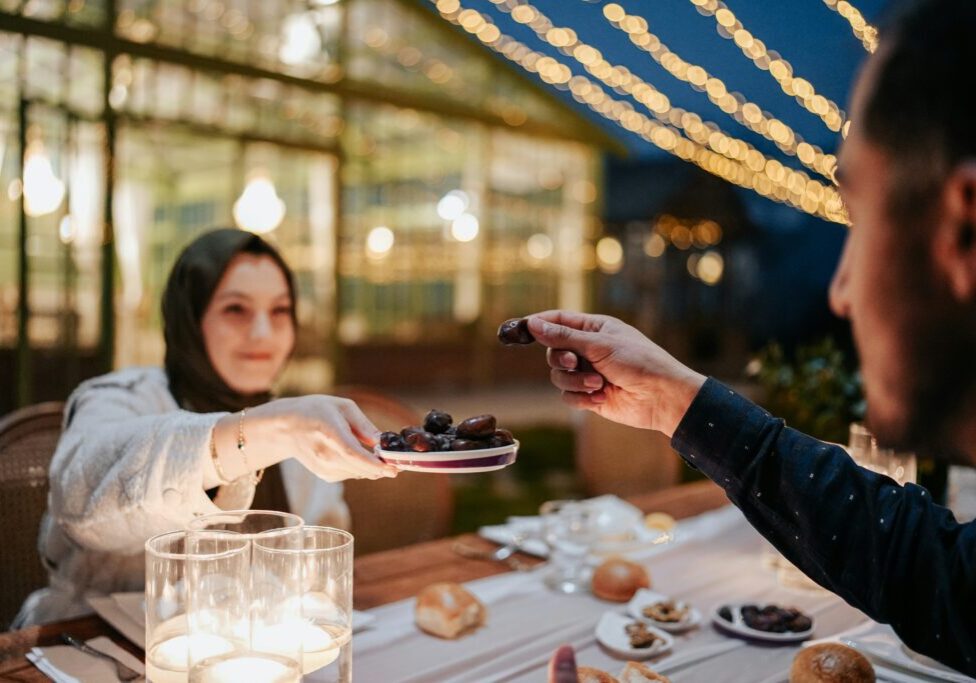Exploring Ramadan: A Flavorful Journey of Faith and Food

Ramadan, the holiest month in Islam, is a time of spiritual reflection, prayer, and fasting for millions of Muslims around the world. Those of us who are unfamiliar with this sacred tradition may wonder how exactly it works. Join us to explore the rich food traditions of Ramadan and learn how we can all show support and solidarity to our Muslim friends and neighbors during this special time.

What is Ramadan?
Ramadan is the ninth month of the Islamic lunar calendar, during which Muslims observe a period of fasting from dawn until sunset. This fasting, known as sawm, is one of the Five Pillars of Islam and is intended to purify the soul, cultivate empathy for those less fortunate, and strengthen one’s connection with Allah.
Breaking the Fast: Iftar
Now, let’s talk about the highlight of Ramadan: iftar, the meal that breaks the day-long fast. Imagine the scene: the sun dips below the horizon, the call to prayer echoes through the air, and families and friends gather around the table to break their fast together. It’s a joyous occasion filled with laughter, love, and, of course, delicious food.


Delightful Dishes of Iftar
During Ramadan, iftar tables are adorned with an array of mouthwatering dishes, each lovingly prepared to nourish the body and soul after a day of fasting. Options include everything from savory samosas and crispy pakoras to fragrant biryanis and creamy lentil soups. Dates, a traditional way to break the fast, are often the first thing consumed, followed by a variety of dishes that vary by region and culture.
Ending with Eid
Eid al-Fitr, often referred to as the “Festival of Breaking the Fast,” marks the end of Ramadan and is celebrated with prayers, feasting, and giving of gifts to the less fortunate. It’s a joyous occasion that brings families and communities together in gratitude and celebration.


Health Considerations During Ramadan
People who are elderly, pregnant, nursing, menstruating, traveling, or experiencing illness are usually exempted from fasting. Because Ramadan requires participants to abstain even from medications during the fasting period, participants consult with their medical professionals to ensure that fasting is safe and appropriate for them. It’s important for those who are fasting to stay hydrated and consume nutritious meals during non-fasting hours to maintain energy levels and support overall health.
How to Support People Celebrating Ramadan
Now, you may be wondering, “How can I show support and solidarity to my Muslim friends and neighbors during Ramadan?” First and foremost, take the time to educate yourself about Ramadan and its significance. (Spoiler alert, you’re already doing that by reading this post!) Understanding goes a long way in fostering empathy and connection.
Remember to be respectful about eating and drinking around people celebrating Ramadan. Some might be more sensitive than others. When in doubt, just ask!
Next, consider extending an invitation to your Muslim friends for iftar. It is customary to visit friends and family during this time. It’s also considered a blessing to feed others during iftar, so you may find yourself invited to share in their celebrations. If you’re up for it, you could also host an iftar meal at your own home. The act of breaking bread together can create bonds that transcend cultural and religious differences.
If you’re planning a social gathering or event during Ramadan, be mindful of scheduling and accommodations. Avoid planning events during iftar time, and if possible, provide halal options for food and beverages.
Finally, don’t underestimate the power of a kind gesture or word. A simple “Ramadan Mubarak” (which means “blessed Ramadan”) or offering to lend a hand with errands or chores can go a long way in showing your support and solidarity.

Ramadan is a time of spiritual renewal, community, and delicious food. By taking the time to learn about Ramadan and how we can support our Muslim friends and neighbors, we can foster understanding and empathy. We can also strengthen the bonds of friendship and community. So let’s come together, share a meal, and celebrate the beauty of Ramadan with open hearts and open minds. Ramadan Mubarak to all! 🌙🍽️
